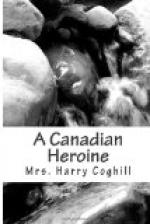“I must speak to you about this, Lucia,” she said. “I do not want to be harsh, but you ought to know what you have done. And, good heavens! for what? A stranger, a mere coxcomb comes in your way, and you listen to his fine words, and straight begin to be able to see nothing but him, though the most faithful, generous heart a girl ever had offered to her is in your very hand! I was bad enough—but I had no such love as Maurice’s to leave behind me.”
Again Lucia moved, without speaking. As she did so, the ring on her hand flashed.
“What is that on your finger?” Mrs. Costello asked.
“Maurice’s ring. He was not so hard on me.”
“Hard?” Mrs. Costello was pressing her hand more and more tightly to her side. “Child, it is you that have been hard with your unconscious ways.”
But Lucia had found power to speak at last.
“After all,” she said obstinately, “I neither see why I should be supposed to have done wrong, nor why anybody else should be spoken of so. It is no harm, and no shame,” she went on, raising her head, and showing her burning cheeks, “for a girl to like somebody who cares very much for her; and I think she would be a poor creature if she did not go on caring for him as long as she believed he was true to her.”
The little spark of pride died out with the last words, and there was a faint quiver in her voice.
“Maurice would say so himself,” she ended, triumphantly.
“Of course he would. But I don’t see that Maurice would be a fair judge of the case. The question is, what does a girl deserve who has to choose between Maurice and Percy, and chooses Percy?”
Lucia recoiled. She could hardly yet bear to hear the name she had been dreaming over so long spoken in so harsh a way, and still less to hear it coupled in this way with Maurice’s.
“Maurice will soon find somebody else,” she said. “He is not a poor man, mamma, that he should mind so much.”
Mrs. Costello half rose from the sofa. Pain and anger together overpowered her. She stood up for a moment, trying to speak, and then suddenly fell back, fainting.
Lucia sprang from her knees. Was her mother dead? It was possible, she knew. Had they parted for ever in anger? But the idea, from its very horror, did not affect her as a lighter fear might have done. She brought remedies, and called Claudine to help her, in a kind of calm. They tried all they could think of, and at last there came some feeble return of life. But the agitation and fatigue of the day had been too much for such strength as hers to rally from. One fainting fit succeeded another, with scarcely a moment’s interval.
All evening it was the same. A doctor came, and stayed till the attacks ceased; but when he went away, his patient lay, white and almost unconscious even of Lucia’s presence. It was terrible sitting there by the bedside, and watching for every slight movement—for the hope of a word or a smile. It was consolation unspeakable when, late at night, Mrs. Costello opened her eyes, free from the bewildered look of suffering, and, seeing her child’s pale face beside her, put out her hand, and said softly, “My poor Lucia!”




